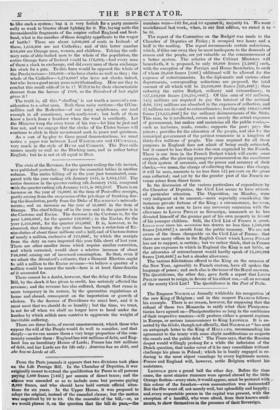From the Paris journals it appears that two divisions took
place on the Life Peerage Bill. In the Chamber of Deputies, it was originally meant to extend the qualification for Peers to all persons paying 3,000 francs [1401.] per annum of direct taxes; and the *base was amended so as to include none but persons paying 3,000 francs, and who should have held certain official situa- tions for six years. In the Upper House, it was proposed to adopt the original, instead of the amended clause; but the motion -was negatived by 89 to 69. On the ensemble of the bill,—or, as we would phrase it, on the question that the bill do pass,—the numbers were-102 for,.and 68 against it; majority 34.- We were misinformed last week, when, in our first edition, we stated it to be 36.
The report of the Committee on the- Budget was made to the Chamber of Deputies on Friday ; it occupied two hours and a half in the reading. The report recommends certain reductions, which, if (like our own) they be most inadequate to the demands of reason and the people, are yet valuable as the commencement of a better system. The salaries of the Cabinet Ministers will henceforth, it is proposed, be only 80,000 francs [3,200/.1 each, with the exception of the Foreign and Home Secretaries, to each of whom 20,000 francs [800/1 additional will be allowed for the expense of entertainments. In the diplomatic and various other departments, corresponding reductions are proposed, the total amount of all which will be 20,660,000 francs [826,400!.]: thus reducing the entire Budget, ordinary and extraordinary, to 957,120,000 francs [38,284,8004 Of this sum of 957 millions, 3451 millions are required to pay the interest of the national debt, 1181 millions are absorbed in the expenses of collection, and 21 millions are devoted to extraordinaries; leaving only 490,658,000 francs D9,625,0001.] for the ordinary disbursements of the State. This sum, be it recollected, covers not merely the actual expenses of government, but makes and maintains all the public works,— such as harbours, roads, canals; supports the poor; pays the priests ; provides for the education of the people, and also fbr the municipal govermnent of the pettiest commune in a kingdom of thirty-five millions of people. The sum required for all these purposes in England does not admit of being easily estimated, but it cannot be less than twice the sum expended by the French.
There is one item in the French Budget which will excite some surprise, after the glowing panegyric pronounced on the excellence of their system of' accounts, and the power and accuracy of their checks,—we mean, the charge of collecting the taxes : this charge, it will be seen, amounts to no less than 12A per cent, on the gross sum collected; and yet by far the greater part of the French re- venue arises from direct taxes.
In the discussion of the various particulars of expenditure by the Chamber of Deputies, the Civil List seems to have attract- ed particular attention. The Opposition, on Monday, were very indignant at its amount,—more especially considering the immense private fortune of the King; a circumstance, however, which does not seem to have any necessary connexion with the allowance to Louis PHILIP as Sovereign, inasmuch as he has divested himself of the greater part of his own property in favour of his younger children. Still, the Civil List of France is great. Louis ever since his zieuessiou has drawn no less than 1,500,000 francs [60,0001.] a month from the public treasury. • We are not aware of the items chargeable on the Civil List of France: that there are many offices in the English Court which Louis PHILIP. has not to support, * certain; but we rather think, that in France there are expenses to which in England the King is not liable, or the advocates of retrenchment would hardly speak of 12,500,000 francs [500,0001.] as but a slender allowance.
The various felicitations offered to the King on the occasion of the New Year, agreeably to French custom, have all spoken the language of peace; and such also is the tenor of the Royal answers. The Quotidienne, the other day, gave forth a report that LOUIS PHILIP meant to resign, in favour of his eldest son,—all on account of the scanty Civil List! The Quotidienne is the Post of Paris.






























 Previous page
Previous page